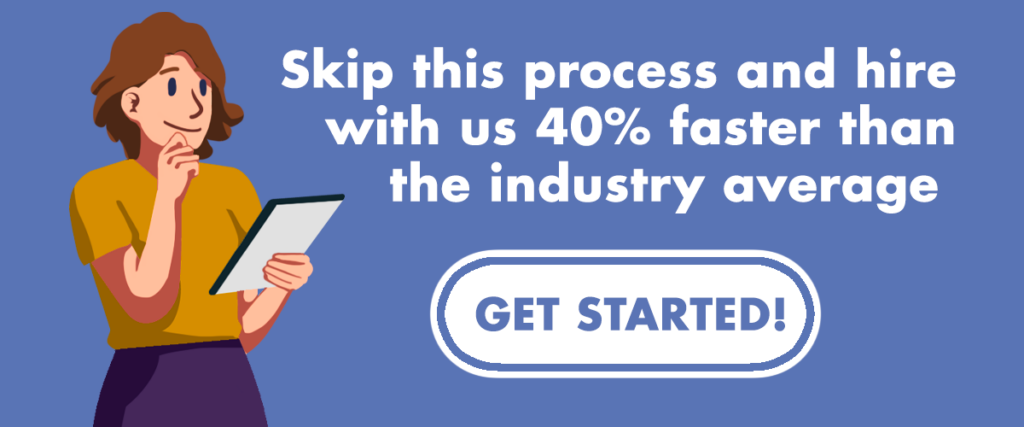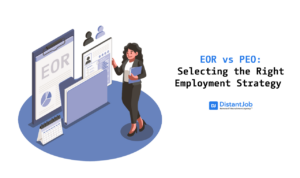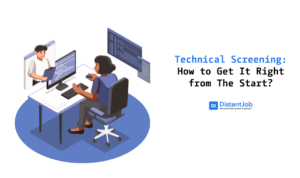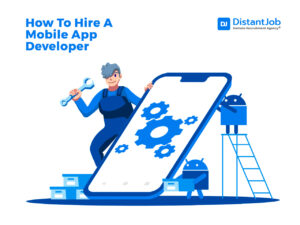What Senior Developer Interview Questions to Ask to Hire The Best Candidate?
Years ago, IT recruiters thought that the best way to interview programmers was with the famous whiteboard tests. However, whiteboard interviews have slowly been replaced with better alternatives. Many developers have admitted to cheating during whiteboard exams, and even famous programmers admitted not knowing how to solve specific exercises.
Interviewing senior developers is more than simply testing their coding skills. They need to have the right mindset to work in your company, as well as social skills to interact with their team, so it’s important to assess them in those areas as well. This means you’ll probably need several different interviews and different methods to conduct each of them.
In this article, we’ll present an example testing battery for your candidates, as well as some senior developer interview questions you can ask along the process.
How To Conduct a Successful Meeting with a Senior Software Developer?
Before even looking for candidates and preparing your senior software developer interview questions and answers, it’s a good idea to know exactly the type of developer you’re looking for. Here are some of the most sought-after skills for a senior developer:
Technical Skills
Senior software developers tend to move away from positions where they code themselves, but it is still important to know the intricacies of their chosen technology so they can help the people under their wing to solve issues and help them succeed.
Here are some core technical skills your senior developer should demonstrate:
- Proficiency in a few chosen languages, toolkits, frameworks, and other technologies relevant to the position
- Knowledge of software architecture and design
- Ability to write clear and detailed software technical specification documentation
- Experience with software project organization and structure
- Familiarity with version control and best practices on how to use it
- Adept with the most common project management approaches and frameworks such as Agile, Lean, etc.
Soft Skills
More important than technical skills, soft skills are the bread and butter of a senior software developer’s job. They will deal with people with various backgrounds, sometimes at the same time, and they must be prepared to not only lead the developers on their team but also communicate with people outside their team, be it other departments in your company or even project owners and clients.
Here are some of the most important soft skills for a senior developer:
- Effective oral and written communication
- The ability to lead and take responsibility for a project or a team
- Willingness to both mentor and learn from their team
- Good at estimating task complexity and risk to better predict project timelines
- The capacity to think critically of their work and that of others
- Good problem-solving skills and attention to detail
Best Senior Developer Interview Questions
It’s not always easy to evaluate all the qualities needed of a senior developer in a single interview. Depending on the type of job, a senior developer will need a specific combination of technical and soft skills. To test your candidates thoroughly, we recommend having at least three rounds of questions: one for behavioral qualities, one for technical knowledge, and one for team integration.
We’ve also gathered a list of questions for each interview round that will help you decipher if a candidate is truly the software developer you’re looking for. Or you can always leave the recruitment and interview process to us!
Round 1: Behavioral Interview
This round is all about learning the personality of your candidate and seeing if they fit the company’s culture and the team they’ll be integrating. Time to start thinking about appropriate senior software engineer behavioral interview questions.
Here are a few to help you get started:
1. What was the last time you made a critical decision during a project?
If you want someone with enough expertise in your team, you need to make sure that they have taken charge of projects previously and how they turned out. Here, you’re looking for someone who explains why the decision they took was critical and how they managed it.
Another point to take note of is if they asked for their team’s help or wanted to do everything by themselves.
2. Tell me about a time you had a disagreement with your team? How did you manage it?
This question helps you understand more the candidate’s personality traits and how they get along with different opinions. Candidates should be specific when developing the answer, explaining to you why the problem happened and what strategies they use to understand the conflict and to solve it.
3. How would you explain the concept of ____________ to a 5-year-old?
This concept should be both technical in nature and also something that the senior will be familiar with. You’re not exactly testing the validity of their response (although that’s also important!), but rather how the candidate presents this technical information to someone who is clearly not versed in such matters.
4. What’s an example of a stressful situation you had to deal with? How did you handle it?
You’re looking for someone that responds well to working under pressure, and this question helps you assess if that’s the case with your candidate.
Inevitably, projects will derail. Team leads will have to relay this information to the leadership and clients, as well as take a strong stance that other team members can look to for support. These situations will usually take a toll on the dev team, and it’s up to their leaders to steer them firmly to solve the problem as promptly as possible while being understanding of their needs.
5. What was a complex problem you had to solve in a project? How did you partition the tasks and prioritize them?
Besides being good at evaluating a candidate’s ability to estimate task complexity and time management, this question also serves as an open point for the candidate to talk about their critical thinking and problem-solving skills.
During the course of a project, it’s unavoidable to find tasks that aren’t as well documented or researched, and it’s up to the people working on them to come up with creative or inventive solutions to these problems. Use this question to learn how your senior developer leads with unknowns.
Round 2: Technical Interview
In this interview round, you want to test the technical skills of your candidate. Time to come up with relevant senior software engineer technical interview questions and answers.
These will need to pertain to the types of technologies your company and the candidate’s future team deal with, so be prepared to come up with more in-depth or specific questions than the ones we present here.
Don’t be afraid to be specific when asking senior developer interview questions: C# advanced functionalities, Java’s inner workings, Python’s scripting capabilities; it all depends on the type of technical skills you’re looking for.
Do note that, with seniority, developers will usually steer away from heavy coding to focus on knowing technical concepts and how to implement them and leadership skills to help the people under their wing. They should be able to explain concepts and even provide a workable start, but coding them completely may be out of their ability, so avoid questions where you ask them to provide code samples and focus more on explaining concepts.
Here are a few questions you can ask at this stage:
1. What programming languages do you use the most?
When you’re looking to hire a software developer, you’ll want someone who, while doesn’t program heavily due to their job, has a good knowledge of a select programming language. Bonus points if they use those languages outside of work for personal projects, which means that they make an effort to keep up with their programming skills.
Some programming languages are more important than others, depending on what your company and your team are working on. For instance, for web development, programmers must be proficient in JavaScript, HTML, and CSS.
As an example, here is GitHub’s 2022 list of the 10 most popular programming languages as per Octoverse:
- JavaScript
- Python
- Java
- TypeScript
- C#
- C++
- PHP
- Shell
- C
- Ruby
2. What is the difference between functional and Object Oriented Programming (OOP)?
These are two programming paradigms that tell you how code is structured.
Functional Programming centers code development around functions. In this paradigm, functions do not change the global state of the program (thus called “pure functions”), nor do they change the data that it uses, instead creating new data. Loops in this paradigm are often created with recursive functions, where instead of returning a value, a function will return a call to a function instead (often itself with different parameters).
Object Oriented Programming, on the other hand, uses objects to structure its code. These objects will contain relevant properties (variables) and methods (functions), to allow them to make changes to their own internal information, as well as the overall state of the program. These objects can have a structured relationship and communicate with each other to create more complex functionality. Methods can have self-contained loops without needing to call other functions.
3. What development methodologies are you familiar with?
If your team uses a specific development methodology, it’s crucial to make sure that the candidate understands it and has used it before. For example, if your team follows the Agile methodology, which centers mainly on iterative development, having a candidate who has experience working with it and it’s familiarized with all the concepts will make the onboarding process and the general experience smoother.
4. How would you set up tests to find bugs in an application?
Testing bugs are part of a developer’s life, as they tend to appear when building software. Finding bugs is about creating tests that are conducted through several instances of the development stages. That way, when the final product is ready, you will have an error-free application.
A senior developer should be able to explain to you their process and why testing and finding bugs is important. Remember that every developer has their own process. Many alternatives are great answers, which is why when interviewing, you need to make sure you know about software development and what they are talking about.
5. How would you implement a quality control process when developing software?
When working on a software project, team members must be aware of small details. One tiny error can have a significant impact, so when interviewing candidates, look for the ones that are methodological and care that the final product is flawless.
Ask the candidate about how their quality control process looks and what tools they use to test results and see if they have succeeded.
6. You’ve just been handed a legacy project that is difficult to maintain. What would you do to improve its maintainability?
This is a common pain point for many companies. As projects get older, their maintainability will suffer, so it’s important to establish ways to upgrade these projects so they are easier to deal with. Candidates should be aware of strategies and tools that help developers with this endeavor.
Pay attention to the types of strategies that your candidate talks about. The answer will largely depend on the type of code and the company’s business but look for the details in the answer: the more specific and thorough plans, the better.
7. When would you implement a NoSQL database in a project versus a SQL database?
This can also be asked as: “When would you implement a non-relational database in a project versus a relational database?”
Non-relational databases are usually employed in smaller projects that want to be more flexible and iterate faster, foregoing a lot of the complications and restrictions of a normal database, while relational databases are seen as a more mature and robust yet complicated system to implement.
Relational databases rely on the ACID principle:
- [A]tomicity: Transactions are atomic – they either happen or do not. There is no in-between.
- [C]onsistency: Databases must be consistent before and after a transaction.
- [I]solation: Multiple transactions can occur independently and without interfering with each other.
- [D]urability: A successful transaction changes the system immediately (is written to non-volatile memory), and those changes persist even in the case of system failure.
Relational databases are very structured and thus very good at maintaining large systems, but are more difficult to change the bigger they get.
Conversely, non-relational databases follow the CAP principle, which states that a networked data-sharing system can only support two out of three major properties:
- [C]onsistency: No matter which endpoint you access to get the data you need, you’ll always get the same result. Everyone should have the same view of the data.
- [A]vailability: Each read or write request should succeed or provide a message when it fails and should process requests within a reasonable time frame.
- [P]artition Tolerance: The system as a whole should continue to be functional even in case of network or node failures.
Non-relational databases allow for dynamic ways to store data without a predefined structure. Changes in these types of databases are usually simpler to implement. Also, they tend to be distributed along various points in a network, as opposed to relational databases, which are usually one big monolith accessible at a single endpoint.
The answer given by your candidate should mention the advantages and drawbacks of each type of database, and what types of projects are better suited for each.
8. How would you go about designing a database structure for _________?
This question serves many purposes at once. The candidate should immediately start asking for specifics to elaborate on their architecture. This will give you a glimpse of their technical problem-solving skills as well as how they gather the requirements for a system.
This can also be a great question to evaluate how familiar they are with the subject at hand. Ask this question pertaining to a system that is relevant to your business. Your candidate should be familiar with the field and ask very pointed questions such as:
- Should I be concerned with W?
- Is X a key information point for the product?
- Does this imply an external factor Y?
- Are you looking to implement Z technology?
And you should see a natural evolution in the architecture based on your answers. If they ask you for the very basics of the business or take too much time to evaluate your answers to their questions, then that is an immediate red flag.
9. What is Big-O Notation?
Big-O notation is used to describe the performance and complexity of an algorithm as its input increases in size. It gives you an estimate of the complexity and time taken to calculate the output with arbitrary input.
The most common magnitudes of this notation used are:
- O(1) or constant: the output always takes the same time to calculate, no matter the input.
- O(log n) or logarithmic: the time to calculate the output will be quick at smaller inputs, quickly rise as the input size increases, but will hit a plateau at a certain point.
- O(n) or linear: the time taken to calculate the output is directly related to the size of the input.
- O(n²) or subquadratic: the time taken to calculate the output increases sharply with bigger inputs.
10. What are the most important points to consider when reviewing another team member’s code?
In this question, you’re looking for the types of details the candidate would look for when evaluating code. You’ll want someone with an eye for detail that shares a common vision about code structuring and analysis with the rest of your dev team. Here are some generic pointers for a good answer:
- Consistent naming conventions
- Readable, instantly understandable, concise, and clean code
- No repetition
- Good coverage of unit tests
Round 3: Team Interview
The team interview is done with developers from the candidate’s future team. In this stage, you’ll want to get a feel for how the candidate interacts with their future team and how they would fit with the project.
Questions at this stage should be more focused on situation hypotheticals that help you make an image of how they would tackle problems and thus find out if their approaches make them a good candidate for the team.
1. What would you do if a junior developer on the team questioned your decisions?
Being a leader/mentor is more than just giving out orders and forcing their own views on the rest of the team.
You’ll want someone that is open to criticism and feedback and is able to find a common middle-ground when disagreements inevitably arise. This should be true at any expertise level: junior developers can have as valid opinions as seniors.
2. How would you motivate demoralized team members?
Leading a team is celebrating their successes with them as much as supporting them in times when they feel more disenfranchised. You’ll want someone who:
- Looks to their team as individuals with clear strengths and interests and lets each individual pursue them as much as possible in their workplace environment.
- Can provide constructive criticism to their team when a job is not done as expected, but also recognizes the worth of their successful endeavors.
- Fosters an environment where the team feels heard and that their opinions matter.
- Communicates with their team effectively and makes sure to establish early on what is expected of them as well as what can be expected of the senior in return.
3. What would your strategy be to onboard a new employee?
In this question, you’re testing your candidate to see if they can successfully integrate new people into his team. Good points to touch on would be:
- Establish communication with the new employee even before they officially enter the company, and provide them with a welcome kit that features all the needed materials to start on the right foot on their first day.
- Promote events or small gestures that help the new employee meet the rest of the team and acclimate to their work environment.
- Take time to personal check-in with the new employee regularly in the first few weeks of work, hear their feedback, and act on it if necessary.
We Can Help You
These questions can give you a wide panorama of a candidate’s knowledge. A great candidate will be able to answer all these questions without hesitating. However, more specific questions will depend on the role you´re hiring for.
Certain skills require more detailed questions. If you’re hiring for web development versus regular software development, for example, you’ll want to guide your questions accordingly and focus on the skills needed for each job.
If your HR team is filled with recruiters with backgrounds in tech and knows what questions to ask, you have nothing to worry about. But if you struggle to hire the right software developer for your project, then we can be your partner.
As a leading remote recruitment agency, DistantJob is made up of IT recruiters with vast knowledge and experience, headhunting talented global developers. We don’t care only about technical skills, but we make sure that your next hire will perfectly adapt to your company culture as well. We can get you the right person for your job opening in as little as two weeks.
Interested in getting the best remote developer possible to work for you? Contact us or visit us today in our office in Montreal!





